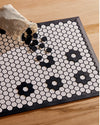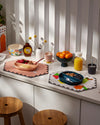
Doormats serve as the unsung heroes of home maintenance, quietly combating dirt and debris to keep our living spaces clean. Among the various types of doormats available, coir doormats stand out due to their natural origin and rustic charm.
Made from the tough fibers of coconut husks, coir doormats can be practical and environmentally friendly. Let’s find out what coir doormats are, exploring their benefits and drawbacks to help you decide if they are the right choice for your home or business!
What Is Coir?
Coir is a natural fiber extracted from between the hard, internal shell and the outer coat of a coconut. The process of extracting coir involves retting the coconut husks to loosen and separate the fibers, followed by spinning them into yarns that can be woven into mats.
Coir production is typically carried out in tropical countries like India and Sri Lanka, where coconut production is abundant. The fiber is known for its durability and moisture resistance, making it ideal for doormat production.
What Are the Characteristics of Coir Doormats?
Coir doormats are renowned for their rugged texture and natural brown color — it may vary slightly depending on the age and processing of the fiber. These doormats typically feature a coarse surface that excels in scraping dirt and mud from shoes. So, they are particularly useful for placements at entry points of homes and businesses!
The aesthetic appeal of coir doormats is mostly due to their earthy look, which can complement both modern and traditional décor. They are usually available in various weaves and designs — from simple, tight weaves for durability to ornate stenciled patterns that add a little artistry to your space.
What Are the Pros of Coir Doormats?
Now that you know a little more about coir doormats, let’s chat about what makes them so special:
Durability
One of the biggest advantages of coir doormats is their durability. Coir fibers are naturally tough and resistant to wear and tear, so they’re perfect for areas that many people walk through. They can retain their functionality over time. Their resilience makes them a cost-effective option since they don’t need frequent replacement.
Natural Appeal
Coir doormats are made from 100 percent natural coconut fibers, making them an eco-friendly choice for environmentally conscious buyers. As a sustainable resource, coir has a minimal environmental impact compared to synthetic materials, which often require more energy and produce more waste during manufacturing.
Also, the natural rustic look of coir doormats can add a pop of uniqueness to any entryway, blending seamlessly with wood, stone, and other natural elements!
Efficiency in Dirt Trapping
Thanks to their coarse and rugged texture, coir doormats excel at trapping dirt and debris! The stiff bristles effectively scrape off mud and dirt from shoes before they enter your home. Luckily, this reduces the amount of cleaning required inside. This feature is extra beneficial during rainy or snowy seasons when the indoors can get particularly grimy.
Low Maintenance
Despite their rough texture, coir doormats are pretty easy to maintain. They can be easily cleaned by shaking them out or vacuuming to remove loose dirt. For more thorough cleaning, scrubbing with a simple mixture of soap and water will do, followed by air-drying.
It’s important to note that coir mats should not be left overly wet. They’re best maintained in dry conditions to prevent mold or mildew formation.
What Are the Cons of Coir Doormats?
We’ve touched on the pros, but we want to be as transparent as possible. So, let’s talk about why coir doormats may not be so great:
Weather Sensitivity
While coir doormats are excellent for dry conditions, their performance can be less than ideal in wet environments. Coir is absorbent and can retain moisture, leading to the mat becoming soggy and less effective at removing dirt. Prolonged exposure to moisture can also result in the growth of mold and mildew, potentially causing odors and deterioration of the mat. That’s the last thing we all want!
Fraying and Shedding
Over time, coir doormats may begin to fray or shed, particularly if they are not maintained properly or are constantly getting soaked. The natural fibers can break down, leading to bits of coir being tracked inside the home, which can be a nuisance to clean up. However, note that this issue tends to be more problematic in cheaper or lower-quality coir mats. So, invest in quality!
Limited Design Flexibility
While coir doormats are available in a variety of designs and patterns, the options for intricate designs and vibrant colors are limited due to the nature of the material. Coir typically retains its natural color, and while it can be dyed, the colors may not be as bright or as lasting as those on synthetic mats. This can be a drawback for those looking to match their doormats with specific color schemes!
Roughness
The same coarse texture that makes coir mats effective for scraping dirt can also be a disadvantage. Bummer, right?
Coir doormats are rough to the touch, which can be uncomfortable for bare feet or pets. This roughness can make it not-so-ideal in areas where people frequently walk barefoot, such as poolside or when lounging indoors.
How To Make the Right Choice
When thinking about a coir doormat for your home or business, it's important to think about your exact needs. The following can help you make your decision:
Location (Indoor vs. Outdoor)
Coir doormats are typically used outdoors due to their robust dirt-scraping capabilities. However, if you plan to use one indoors, consider its placement. It’s best situated in enclosed spaces like sunrooms or covered porches where it remains dry and protected from excessive moisture.
Climate Considerations
The climate in your area is important for the suitability of coir doormats. In dry, arid regions, coir mats are perfect, maintaining their structure and effectiveness. However, in wet climates, you might want to reconsider or ensure the mat has adequate shelter to prevent moisture accumulation and the associated problems of mold and mildew.
Aesthetic Needs
Coir's natural look provides an earthy, robust aesthetic that complements many décor styles, especially rustic and natural themes. However, if your decor requires vibrant colors or intricate patterns, you might find the options in coir somewhat limiting. Consider how important the visual aspect of the doormat is to your overall decor.
Alternatives to Coir Doormats
If coir does not seem to fit your needs, consider other materials like rubber, synthetic, or fabric doormats. Rubber doormats are durable and handle moisture well, making them suitable for very wet climates. Synthetic mats offer more variety in color and design, and they can be easier on bare feet. Fabric doormats, while less durable for heavy-duty use, can offer specific textures and designs for indoor aesthetics.
Tile doormats offer a durable and stylish alternative to traditional materials. Made from ceramic or porcelain, a high-quality tile mat can withstand harsh weather conditions and high foot traffic, making them ideal for both indoor and outdoor settings.
With various colors and patterns available, tile doormats can be customized to match any decor style. Additionally, their easy-to-clean surface makes maintenance a breeze, ensuring a clean and inviting entryway.
Wrapping Up: Is a Coir Doormat Right for You?
Coir doormats’ ability to trap dirt effectively and maintain durability under foot traffic makes them a practical option for homes and offices alike! However, wet conditions can hinder their performance, and their rough texture may not be suitable for all settings.
When choosing a doormat, it's important to consider the specific conditions and needs of your space. Coir may be ideal for dry, covered areas, adding a rustic charm to your décor, while alternative materials might better serve in other climates.
Ultimately, the right doormat will keep your space clean and complement your home's character and style. Check out our tile mats at Letterfolk — customization and practicality? Absolutely!
Sources:
A state-of-the-art review on coir fiber-reinforced biocomposites | Royal Society of Chemistry
Mold and Mildew Overview | Oregon State University
Profiles of 15 of the world's major plant and animal fibres | FAO






